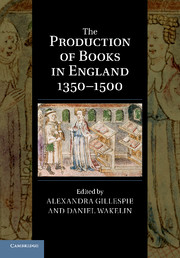Book contents
- Frontmatter
- Contents
- List of illustrations
- List of contributors
- Foreword
- Acknowledgements
- List of abbreviations
- Introduction
- 1 Materials
- 2 Writing the words
- 3 Mapping the words
- 4 Designing the page
- 5 Decorating and illustrating the page
- 6 Compiling the book
- 7 Bookbinding
- 8 Commercial organization and economic innovation
- 9 Vernacular literary manuscripts and their scribes
- 10 Book production outside commercial contexts
- 11 Censorship
- 12 Books beyond England
- 13 English books and the continent
- Afterword: the book in culture
- Bibliography
- Index of manuscripts
- General index
9 - Vernacular literary manuscripts and their scribes
Published online by Cambridge University Press: 05 May 2014
- Frontmatter
- Contents
- List of illustrations
- List of contributors
- Foreword
- Acknowledgements
- List of abbreviations
- Introduction
- 1 Materials
- 2 Writing the words
- 3 Mapping the words
- 4 Designing the page
- 5 Decorating and illustrating the page
- 6 Compiling the book
- 7 Bookbinding
- 8 Commercial organization and economic innovation
- 9 Vernacular literary manuscripts and their scribes
- 10 Book production outside commercial contexts
- 11 Censorship
- 12 Books beyond England
- 13 English books and the continent
- Afterword: the book in culture
- Bibliography
- Index of manuscripts
- General index
Summary
This chapter will focus on production of vernacular literary manuscripts in the London area during the period after 1350 and to the early sixteenth century. Throughout this period, London seems to have been both origin and centre of secular vernacular literary book production, and many of the scribes we find copying the works of the poets William Langland, Geoffrey Chaucer, John Gower, Thomas Hoccleve, John Lydgate and others appear to have been doing so within the city or in its immediate environs. This is not to say that they were all commercial producers of books: in fact there is only very limited evidence for commercial literary manuscript production before the third quarter of the fifteenth century, near the end of the period under question. One must be careful to draw distinctions between scribes copying vernacular literary texts (who seem to have done so in addition to other jobs involving writing), those copying other kinds of texts, principally in Latin, for high demand, such as school books, works studied at universities, bibles and liturgical manuscripts (who might make up the members of the Mistery or Guild of Textwriters) and those importing books from the continent or re-selling books produced in England. Those producing copies of literary texts in London in the late fourteenth and first half of the fifteenth centuries were professional writers, in the Middle English sense of ‘scribes’, but they do not appear to have made their living principally by copying vernacular literary texts.
- Type
- Chapter
- Information
- The Production of Books in England 1350–1500 , pp. 192 - 211Publisher: Cambridge University PressPrint publication year: 2011
- 16
- Cited by

